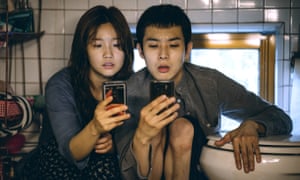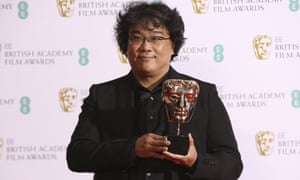Bong Joon-ho plays on working-class stereotypes and fails to examine the system that created the film’s rich and poor
Hahna Yoon
Wed 5 Feb 2020

Parasite lost … The Kim children Ki-jung (Park So-dam) and Ki-woo (Choi Woo-sik) in their cramped home. Photograph: Allstar/Curzon Artificial Eye
Like the character Kim Ki-woo (Choi Woo-sik) in Parasite and its director Bong Joon-ho, I too have entered the home of Seoul’s elite as an English tutor. I live in one of those old Seoul villas and memories of rushing my own white envelope to the bank to pay outstanding phone bills allows me a small window into what’s been called Bong’s “dystopia”. For many, the critically acclaimed film nominated for six Oscars signals the beginning of an overdue appreciation for Asian cinema but it is precisely the issue of representation that makes the undoubtedly beautiful film troubling. Despite being hailed as a social commentary on contemporary South Korean society, Bong misses the mark in his portrayal of the country’s economic crisis and plays on stereotypes of the working class in an attempt to critique capitalism.

Parasite director Bong Joon-ho: 'Korea seems glamorous, but the young are in despair'
Kim Renfro for Business Insider says Parasite is “best seen with absolutely zero context”. It’s true – knowing little about South Korea makes the film easier to digest. Parasite begins on the premise that all four Kims are unemployed and presumably, it is harder for the Kim children – Ki-woo and Ki-jung (Park So-dam) – to find work, as neither have college degrees. The two characters are more plausible without knowing that South Korea’s millennials are some of the most educated in the world – with 70% aged 24 to 35 having some form of tertiary education. (In real life, could Ki-woo have scored so poorly on the exam that he was not accepted into any university whatsoever? Unlikely.) Bong is praised for highlighting Hell Chosun – a term to describe the socioeconomic conditions that make it a nightmare to get a job even after receiving a degree but, ironically, this term barely applies to the Kims. Without degrees, it is more likely they would look for work in a sector with a huge labour shortage – such as factory production … or housework.
Alternatively, put aside those reservations and try to see the film as an allegory. It becomes a dark reenactment of the children’s book If You Give a Mouse a Cookie – more about greed than hunger. Ki-woo’s friend finds him a tutoring position at the upscale Park home – one that requires forging a fake diploma. With a wad of cash in his hands, Ki-woo fabricates yet another lie – introducing his sister as an art therapist named Jessica. By eliminating two other employees of the Park home, Ki-taek (their father, played by Song Kang-ho) becomes the chauffeur and Chungsook (their mother) assumes the role of housekeeper. Once the four are happily employed, Ki-woo not only pursues a physical relationship with underage student Dahye (Jung Ziso), but he imagines marrying her and the Kim parents fantasise about the Park house becoming their own. Stop the story here and the film being heralded as a critique of capitalism is more about the dangers of trusting the working class.

Director Bong Joon-ho collected the best foreign
language Bafta for Parasite.
Photograph: Joel C Ryan/Invision/AP
The Kims have no plan, expect full pay for haphazardly folded pizza boxes, raid the Parks’ drinks cabinet and resort to bloody violence. All of Bong’s poor are similarly disorderly and directionless – drunkenly urinating on the street or waiting for free meals like prisoners. Bong argues the film is “a comedy without clowns, a tragedy without villains” but the vulgarity of the film’s working class in bold starkly contrasts the bourgeois elitism in the fine print. As the Parks “give nothing back and don’t really care about anyone other than themselves,” Mark Goldberg for Collider asks if the Parks are the real Parasites, but the Parks are generous in addition to being oblivious. Yeon-gyo (Cho Yeo-jeong) – mother of the Park family – offers higher rates for Ki-woo, compensates Ki-jung for attending a birthday party and pays Ki-taek overtime for working on a Sunday. Even if Dahye’s affections are superficially juvenile, both the Park children seem to genuinely like Ki-woo and “Jessica”.
Here’s the twist: the director clearly wants you to like the Kims. We laugh as Ki-taek rehearses the script that will get the Park’s housekeeper fired, we feel the sting of being smelt and we nod as Chungsook notes kindness too is a luxury – “[the Parks] are nice because they are rich”. In the film’s last scenes, Ki-woo narrates his delusions and we enter into his fantasy of being reunited with his father. In spite of their questionable ethics, why is the audience drawn to side with the Kims? Are the Kims responsible for their own wrongdoings or is their dog-eat-dog mentality an inevitable byproduct of a capitalist society? If Bong’s 2013 film Snowpiercer makes it obvious that capitalism allows the powerful to puppet the powerless, Parasites does not do enough to drive its message home.
Without examining the system that has created the Kims and the Parks, the film’s message is reduced to this: commiserate with the working class – not because they are fully developed human beings with the same ethical dilemmas you have – but because they’re a hopeless lot. Bong himself glides between describing the film as an allegory and insisting he does not have an agenda. “I’m not making a documentary or propaganda here. It’s not about telling you how to change the world or how you should act because something is bad, but rather showing you the terrible, explosive weight of reality,” he told Vulture. As for my dystopia? After four sessions of tutoring, my student decided to “quit English”. When I told her mother I would have to return her upfront payment in instalments because I didn’t have the money, she thought I was lying.
---30---
No comments:
Post a Comment